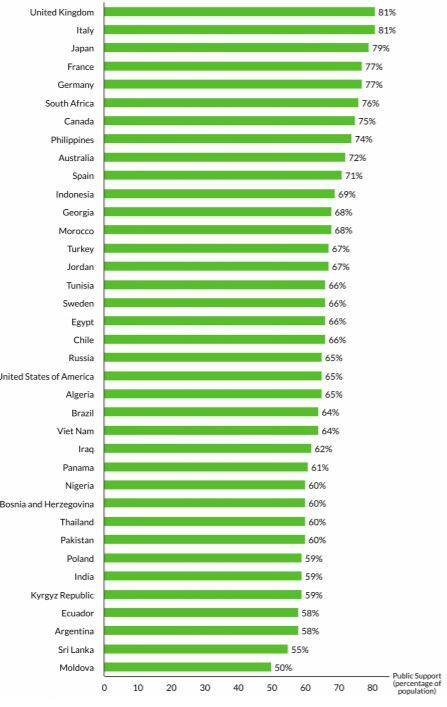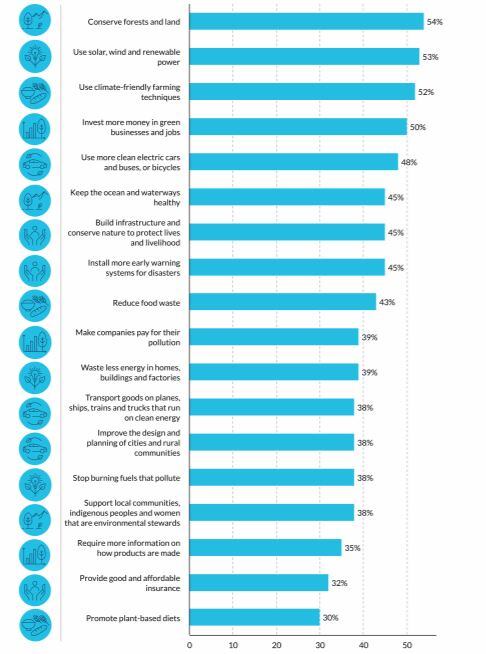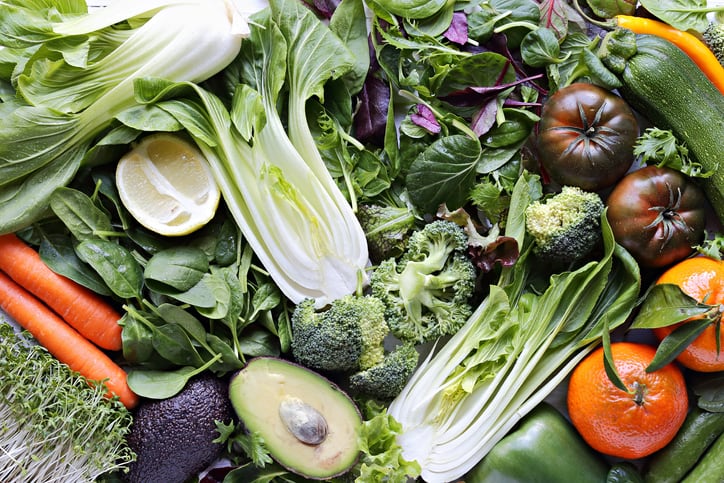More than a million people in 50 countries were questioned by the United Nations Development Programme (UNDP) and Oxford University. Almost half the participants were aged between 14 and 18.
It is the first time that large-scale polling of public opinion about climate change has ever been carried out in many of the participating countries.
The overall findings from young and old showed that 64% of participants believe that climate change is now a global emergency. This idea had the highest support in the UK and Italy where more than 80% were in favour. A majority of all ages agreed climate change is a global emergency.

Conserving forests and lands were the most popular solutions, followed by using more renewable energy. In high-income countries there was a significant majority of support for reducing food waste. But the least favoured of the 18 policy suggestions presented in the poll was switching to a plant-based diet, which was backed by only 30% of those surveyed and failed to attract majority public support in any country. Support was highest in Germany (44%) and the UK (43%).
Four climate policies emerged as the most popular globally:
1. Conservation of forests and land (54% public support)
2. Solar, wind and renewable power (53%)
3. Climate-friendly farming techniques (52%); and
4. Investing more in green businesses and jobs (50%)
The UN Climate Change report last year said that ‘a shift toward plant-based diets’ is one of the most significant ways to reduce greenhouse gases from the agriculture sector.
“Balanced diets, featuring plant-based foods, such as those based on coarse grains, legumes, fruits and vegetables, nuts and seeds, and animal-sourced food produced in resilient, sustainable and low-[greenhouse gas] emission systems, present major opportunities for adaptation and mitigation while generating significant co-benefits in terms of human health,” the report said.
The UNDP survey, which did not define plant-based diets for respondents, claimed the low score for plant-based diet adoption did not signify people are against the policy. “This could be an important opportunity for further education on these topics,” it said, adding “in some countries, there are few plant-based options. In others, there may not yet be significant awareness about these options. In others, people may have felt that diet is more of a personal choice than something that can be ‘promoted’.”
Steven Fisher, Professor from Oxford University, told FoodNavigator: “The report does speculate that education to increase awareness and understanding of the importance of plant-based diet is an issue here.”
The Vegan Society, which described the data as 'hugely positive for the vegan movement', said many of the climate solutions that were included in the poll can only be achieved if implemented together and promoting plant-based diets is one solution that unlocks several others. “A good example of this is ‘Conservation of Forests and Land’ which was the most popular solution according to the poll,” a spokesperson told us.

'Consumers continue to buy meat because they enjoy eating meat'
But the UK’s Association of Independent Meat Suppliers (AIMS) said the finding was simply down to peoples’ preferences. “Consumers continue to buy meat because they enjoy eating meat,” a spokesperson told FoodNavigator. “They appreciate the clear health benefits that it offers to their diets and rightly are shying away from the ‘shouty’, ‘preachy’ content of the plant-based diet promotors.”
The Agriculture and Horticulture Development Board (AHDB) has just launched a £1.5m “Eat Balanced” TV led advertising campaign, encouraging more British households to continue eating meat and dairy as part of a balanced diet.
The AIMS spokesperson added: “Furthermore, we believe that consumers are questioning the globalised plant based-brands and their alleged green credentials and through campaigns such as AHDB’s Eat Balanced have chosen to stick with the positive health and environment messages of British livestock production.”
The British Meat Processors Association added that as consumers become increasingly informed about the true impact that different foods have both on their health and the health of the planet, responsibly produced meat and dairy will play a significant role.
“The new UN survey suggests that people would rather change other aspects of their lifestyle to help the environment than cut out two of the most nutritionally important elements of their diet; meat and dairy,” a spokesperson told us. “And, as they realise that sustainable livestock farming can be part of the solution to climate change, the choice between these natural whole foods and the new ultra-processed plant-based alternatives will become easier to make.”
The spokesperson added that consumers both in Britain and around the world are becoming increasingly aware of the differences in farming systems and are realising that giving up eating British meat will be of much less environmental benefit than giving up eating Brazilian meat.
“It’s also becoming known that substituting British meat for a more environmentally damaging processed plant-based alternative could mean that concerned consumers inadvertently create the opposite effect to the one they intended.”
Sam Feltham, Director of the Public Health Collaboration charity and Organuary, which promotes the health and environmental benefits of organ meats, told FoodNavigator: "We are also very concerned about climate change and agree with the majority of people that switching to a plant-based diet is a least favourable solution. Well managed livestock on pasture is one of the most powerful ways to sequester carbon in the soil and the only way to make it a sustainable solution would be to keep meat and animal products at large in our diets."





